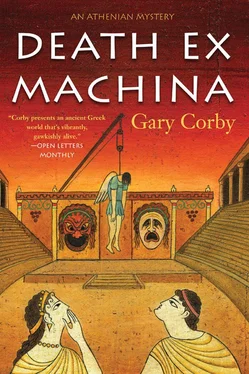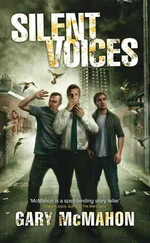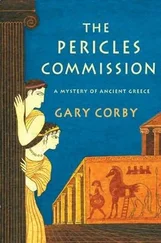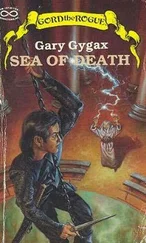Gary Corby - Death Ex Machina
Здесь есть возможность читать онлайн «Gary Corby - Death Ex Machina» весь текст электронной книги совершенно бесплатно (целиком полную версию без сокращений). В некоторых случаях можно слушать аудио, скачать через торрент в формате fb2 и присутствует краткое содержание. Год выпуска: 2015, ISBN: 2015, Издательство: Soho Press, Жанр: Исторический детектив, на английском языке. Описание произведения, (предисловие) а так же отзывы посетителей доступны на портале библиотеки ЛибКат.
- Название:Death Ex Machina
- Автор:
- Издательство:Soho Press
- Жанр:
- Год:2015
- ISBN:978-1-61695-520-5
- Рейтинг книги:3 / 5. Голосов: 1
-
Избранное:Добавить в избранное
- Отзывы:
-
Ваша оценка:
- 60
- 1
- 2
- 3
- 4
- 5
Death Ex Machina: краткое содержание, описание и аннотация
Предлагаем к чтению аннотацию, описание, краткое содержание или предисловие (зависит от того, что написал сам автор книги «Death Ex Machina»). Если вы не нашли необходимую информацию о книге — напишите в комментариях, мы постараемся отыскать её.
Death Ex Machina — читать онлайн бесплатно полную книгу (весь текст) целиком
Ниже представлен текст книги, разбитый по страницам. Система сохранения места последней прочитанной страницы, позволяет с удобством читать онлайн бесплатно книгу «Death Ex Machina», без необходимости каждый раз заново искать на чём Вы остановились. Поставьте закладку, и сможете в любой момент перейти на страницу, на которой закончили чтение.
Интервал:
Закладка:
“Did you have to wait for your father to die?” he asked.
“No, I talked him round.”
“Then you were lucky,” he said sourly. “My father was most unreasonable. He insisted I learn to manage our estates. Then he died. As you see I am a man of middle age, yet only now can I begin my true career.”
“Why begin with a play?” Diotima asked.
“My plan is to become the first man in Athens,” said Thodis modestly. “To that end I have studied the career of Pericles most closely. When Pericles entered public life, the first thing he did was provide a play. He was a choregos.”
That was true. Pericles had funded the play called The Persians written by Aeschylus. It was one reason the two were such good friends.
Thodis said, “I reason that if I do what Pericles did, then it follows that I must eventually attain the same position.”
Thodis was fooling himself. He was no Pericles.
“Thus I spent a substantial part of my inheritance on a play to entertain the people. I’m pleased to say that if my father returned from Hades to see what I’m doing, he’d probably have apoplexy and die again.”
I said, “When you said you had no interested in the theater, you really meant it.”
“Yes. My friends advised me that with Aeschylus retiring, Sophocles is the coming man. As Pericles linked his name to Aeschylus, so I should link mine to Sophocles.”
“I see. Then disaster struck. Is this why you’re avoiding the theater?” I asked.
“Yes. I must dissociate myself from the disaster. Don’t take this personally, but I can hardly afford to have my name linked to someone like you.”
“What about the actors in your play?” Diotima asked.
“What do you mean?” he asked.
“There’s someone who needs your help: Phellis, the actor whose leg was smashed.”
Diotima explained that Melpon the doctor was demanding payment for his use of the healing machine. “Phellis is an actor, he hasn’t enough money to pay the doctor to save his leg.”
When she was finished, Thodis said, “I will think upon it, and I will take advice from my friends. I must say this is hardly my problem.”
“He was injured working on your play.”
“He was hired for the duration of the play, was he not?”
“Well, yes,” Diotima said.
“If you hired an artisan to paint your house, and a third party came along and injured the painter as he worked, you wouldn’t be responsible, would you?”
“Well, no,” Diotima admitted.
“I feel sure the actor’s correct course of action would be to sue the man who injured him.”
“That would be the man who also killed Romanos.”
“Then perhaps you should catch him?” Thodis suggested. “Then you could put your request to the correct source.”
I asked, “Is there anyone you do want to associate with?”
He puffed out his cheeks. “Well, naturally I’ve entertained Sophocles.”
“Naturally,” I said.
“My friends suggested I should also entertain the lead actor. What do they call themselves? Protagonists, yes, that’s right. They tell me that protagonists are important people.”
“I like to think so,” I said.
“Lakon proved to be an entertaining companion, a most charming man. Sophocles less so. He seemed a trifle uncomfortable. All he wanted to talk about was plays and writing.”
“Sad.”
“I thought so. There was no such difficulty with Lakon. He’s a man I could introduce to my friends with no risk of embarrassment.”
I made a mental note to discover who these friends were, so I could avoid them.
Thodis was still speaking. “In fact, I invited Lakon to dine with me on more than one occasion. He has a collection of amusing stories that he tells very well. My other guests were in stitches of laughter. He and his friend Romanos are valuable companions-”
“WHAT!” Diotima and I roared simultaneously, so loudly that Thodis staggered backward. He looked ready to run.
“I’m sorry, Thodis,” Diotima said quickly. “You startled us with your last comment.”
“And you startled me with yours!”
“Thodis, did you say Romanos was a friend of Lakon?” I asked carefully.
Thodis blinked in surprise. “Lakon arrived at one of my symposia arm in arm with Romanos. Of course to receive a guest of a guest is a time-honored tradition. This is how one enlarges one’s circle of connections. I had no objection. I’m not sure why you ask.”
“I ask because I was given to understand that Lakon never socialized with Romanos. You heard Lakon say so himself, at the noon meeting.”
“If he did, I missed it. I was … ah … preoccupied.”
Thodis meant he hadn’t followed events during the meeting. I said, “I distinctly heard Lakon say he didn’t socialize with Romanos.”
“Then you must have misheard, or misunderstood.”
“What do you think?” I asked Diotima as Thodis strode off.
“He’s not going to help Phellis,” she said.
“No. It looks like we’ll have to catch the killer and make him pay.”
“But Nico, what if we can’t do it in time to save Phellis?”
“Banks lend money. Maybe we could get an interim loan to cover the costs?”
“A loan where the only surety is our promise to capture a killer? Does your banker do deals like that?”
“Maybe not,” I said, rubbing my chin. “All right then, what do you think of Thodis as a murderer?”
Diotima said, “Thodis is the last man on earth who would want to ruin his own play.”
“Or at least, he should be,” I said. “I agree.”
“Logically we should cross him off the list of suspects,” Diotima said.
“Right.”
“Then why do I feel like he should be top of the list?” Diotima said.
“Me too,” I said. “We’ll have to keep him in mind.”
“He might have something to hide,” Diotima said. “He has a connection to Romanos that we didn’t know about.”
“Maybe,” I said, though I felt dubious about her theory. “Thodis admitted he knew Romanos without being asked. That looks innocent. The more important news is that Lakon lied when he said he never saw Romanos outside the theater.”
Diotima’s brow furrowed. “Why would he lie about that?”
“Good question. We’ll have to find out.”
Most of the men backstage had disappeared as quickly as they could, but three remained: Sophocles, Aeschylus, and Chorilos. The three tragic writers for this year’s competition were in earnest conversation.
Diotima and I decided to interrupt.
“Excuse me, sirs,” I said. “We have some urgent questions.”
“Hello, Nicolaos. Yes?” Aeschylus said. He and I had become friends during a previous case. The difference in our ages was almost fifty years, yet we got on well. He also had a high regard for Diotima.
“It’s about casting,” I said. “How do you do it?”
“The Eponymous Archon selects who will be the writers, who will be the choregoi, and who can be cast for protagonists,” said Aeschylus.
“Not you, Aeschylus?” Diotima said, surprised. “I thought you simply volunteered your services for the year and then chose your actors.”
All three men laughed.
“If only it were that simple,” said Chorilos. “Take me, for example. I applied to the Archon’s office six months ago. I was one of thirty men. We were all applying for only three slots in the schedule.”
Aeschylus added, “Every writer in Athens is desperate to see his work at the Great Dionysia. It’s a wonder there isn’t a bloodbath every time the authors apply.”
“How does the Archon choose?” Diotima asked.
“Exactly the way any sane person would,” Chorilos said. “The Archon chooses the most popular writers first.” Chorilos glanced at his two colleagues. “I said before that I was one among thirty for three positions, but that wasn’t quite accurate. We all knew that Aeschylus and Sophocles had applied this year. That meant the other thirty had to fight for one slot.”
Читать дальшеИнтервал:
Закладка:
Похожие книги на «Death Ex Machina»
Представляем Вашему вниманию похожие книги на «Death Ex Machina» списком для выбора. Мы отобрали схожую по названию и смыслу литературу в надежде предоставить читателям больше вариантов отыскать новые, интересные, ещё непрочитанные произведения.
Обсуждение, отзывы о книге «Death Ex Machina» и просто собственные мнения читателей. Оставьте ваши комментарии, напишите, что Вы думаете о произведении, его смысле или главных героях. Укажите что конкретно понравилось, а что нет, и почему Вы так считаете.












